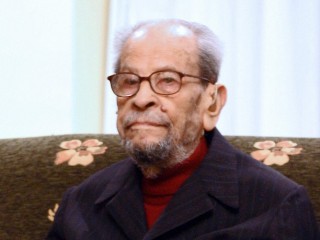
Naguib Mahfouz biography
Date of birth : 1911-12-11
Date of death : 2006-08-30
Birthplace : Cairo, Egypt
Nationality : Egyptian
Category : Famous Figures
Last modified : 2011-09-15
Credited as : writer, Palace Walk, Nobel Prize for literature
0 votes so far
Mahfouz was born in 1911 in Cairo, Egypt, to middle-class parents. He was raised in the Gamaliya district that provided the background for his Cairo Trilogy. His family later moved to the more upscale Abbasiya suburb. Mahfouz knew he wanted to become a writer during his childhood after reading several British detective novels. He attended Islamic elementary schools, and then entered a secular high school. At 17 years old, Mahfouz published his first article. Upon graduation, he entered King Fouad I University.
Shortly before his 21st birthday, Mahfouz published his first novel. He graduated with a degree in philosophy. Though he wrote throughout his life, he also worked in several government positions, including university secretary and assistant to the minister of religious endowments. He also became a director in the Ministry of Culture, and ended his governmental career as the head of the State Cinema Organization, which, among other things, had the power to censor the movies that could be shown in Egypt.
Mahfouz's first novels were historical novels that reflected the current conditions of Egypt. By having the novels based in ancient Egypt, he was able to get around the censors. In 1952 Mahfouz began writing Palace Walk , the first in his Cairo Trilogy . Soon after, Palace of Desire and Sugar Street were written. Unfortunately, he could not find a publisher. Saddened by this turn of events, Mahfouz switched his focus and concentrated on writing short stories and screenplays. A monthly journal agreed to publish his trilogy.
Mahfouz began writing novels again and soon completed his most controversial one, The Children of Gebelawi . The novel was released in Egypt's newspaper, Al Ahram , and its religious overtones brought the ire of Islamic conservatives. The novel was never released in book form in Egypt. While many threats were made against him, Mahfouz carried on until 1994. After Ayatollah Khomeini issued a fatwa (a legal decree that usually called for the death of the agitator), against Indian author Salman Rushdie in 1989, Egyptian extremists pointed to Mahfouz and his Gebelawi novel and also issued a fatwa . He was stabbed in the neck outside of his apartment building. Though the wound missed a vital organ, it caused major nerve damage to his writing hand. Mahfouz, who wrote all of his work in longhand, could no longer write. He entered rehabilitation to regain use of his writing hand, but could not write for periods longer than 30 minutes.
This attack, however, did not slow him down. Though very shy, Mahfouz maintained an active social life, meeting with friends daily at various cafés and restaurants throughout Cairo. Quoted in the Los Angeles Times , he said, "I don't like a week to pass without having gone to the movies, and to the theater, and to have worked and to have met my friends."
In 1988 Mahfouz was awarded the Nobel Prize for Literature, the first Arab author to be honored. Known for rarely leaving Cairo, he sent his two daughters to accept the prize on his behalf. While he had gained acclaim and popularity throughout Egypt and the Middle East, he was a literal unknown to the rest of the world. But with this award, his works began to be published in a variety of languages. According to the New York Times , Mahfouz was "admired for his vivid depictions of modern Egypt and the social, political, and religious dilemmas of its people."
In all, Mahfouz published more than 50 novels, and countless short stories and screenplays. In addition to his trilogy and The Children of Gebelawi , he also gained recognition for The Thieves and the Dogs, Miramar , and The Day the Leader Was Killed . Several of his screenplays were also turned into films.
Mahfouz was still active well into his nineties. He continued to meet with his friends at cafés and held weekly salons to discuss current events. He was in failing health and suffered a fall in July of 2006. He died on August 30, 2006, from a bleeding ulcer at the age of 94. He is survived by his wife, Attiyatullah, and his two daughters, Fatima and Umm Kulthoum.
















